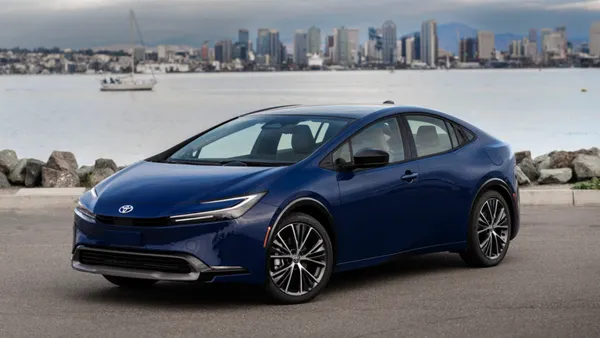Dive Brief:
- Thirty-six percent of large businesses in the U.S. and Europe have aligned their capital expenditures with sustainability goals despite a pullback in the U.S. and other countries from environmental protection efforts including combating climate change, Risilience found in a survey.
- Many companies have woven sustainability into corporate strategy by advancing decarbonization plans, Risilience said. Ninety-five percent of companies list discussion of environmental risks on their standing board agendas, according to Risilience, a consulting firm focused on carbon emission reduction strategies and based in Cambridge, U.K.
- “When over a third of corporate capex is being aligned with sustainability goals, it shows businesses are no longer experimenting with net zero — they are embedding it into strategy, governance and finance,” Risilience CEO Andrew Coburn said. “The leaders are those who are moving from ambition to quantified, finance-grade execution,” he said in a statement.
Dive Insight:
Since his inauguration to a second White House term in January, President Donald Trump has reversed several federal sustainability efforts, including programs aimed at limiting greenhouse gas emissions.
The Department of the Interior in May announced plans to expand the availability of federal lands for leasing of oil and gas extraction rights. The Bureau of Land Management plans to streamline the permitting process, cutting reviews to no more than six months.
Trump in July signed an executive order terminating mandates for clean electricity production and investment tax credits for wind and solar power facilities.
Also in July, the Environmental Protection Agency proposed rescinding the agency’s so-called Endangerment Finding and repealing greenhouse gas emission regulations for motor vehicles and engines.
In its 2009 finding, the EPA said that greenhouse gas emissions endanger public health. The determination was a cornerstone of the Biden administration’s effort to promote electric vehicles.
“The carbon footprint is a hoax made up by people with evil intentions, and they’re heading down a path of total destruction,” Trump said in a speech to the U.N. Tuesday. “It’s the greatest con job ever perpetrated on the world.”
“I'm telling you that if you don't get away from the green energy scam, your country is going to fail,” Trump told world leaders.
Still, 52% of large companies have created plans to achieve net-zero carbon emissions, and 30% are drawing up such roadmaps.
Nearly nine out of 10 companies (88%) have stepped up spending on net-zero strategies even in the face of “geopolitical and economic volatility,” Risilience said.
Also, three out of four decarbonization plans feature a return-on-investment calculation, indicating that companies are quantifying the value of such projects although “challenges remain in standardizing metrics,” according to Risilience.
“Climate and nature risks are no longer abstract sustainability issues, they are real financial risks,” Coburn said. “Companies that act decisively to quantify these risks, embed them into governance and financial systems, and align incentives across their supply chains will build resilience and competitive advantage.”
Resilience surveyed more than 500 decision makers focused on finance or sustainability at companies that generate annual revenue exceeding $700 million.
















